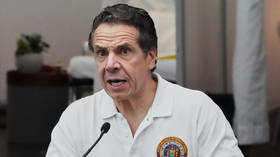Britain's slow transformation into a biosecurity state may be more cock-up than conspiracy, but it's still dangerous
As a result of attempts to control the pandemic, British citizens have found themselves slipping into a hideous form of incompetent, electronic tyranny where the use of ineffective government apps is a condition of our ‘freedom’.
One of the recurrent fears about the endless government intervention into our lives around Covid is that we end up in a ‘biosecurity state’. Instead of ‘papers please’, we'll have to produce our smartphones to prove we deserve the privilege of going about our daily lives. It seems everyday activities such as going to the pub, attending lectures or watching a football match will be dependent on demonstrating our health status.
Meanwhile, we are in the midst of a ‘pingdemic’. Hundreds of thousands of people are being forced into isolation simply because they may have been near someone who has been infected for a few minutes. We're replacing national lockdowns with a swathe of personalised micro-lockdowns, often simply because two smartphones were within Bluetooth range of each other for a few minutes.
Also on rt.com Majority of Covid patients in hospital may have been admitted for OTHER ailments before testing positive, leaked NHS data suggestsAh, the supporters of the tracking app say, there's only a ‘pingdemic’ because cases are rising so much. But how many of those people forced to stay at home – and it's worse than the national lockdowns because you can't leave home at all, even to go to work or buy groceries – go on to test positive for the disease?
The absurdity of it all is illustrated by the Prime Minister Boris Johnson: having had a bad dose of Covid himself and subsequently been double-jabbed with a vaccine, he still had to stick to the rules and isolate when he was pinged. (He's just out of isolation, which he spent in the comfort of Chequers, a rather different experience than most other people forced to isolate.) The upshot of this absurdity is that businesses and public services are suffering to such an extent that it is threatening the health of the economy as well as the mental health of those forced to lock themselves away.
No wonder people who have been pinged have decided to ignore it, particularly once they've had a negative test. And that's not withstanding the many more who have simply deleted the app for fear of being wrongly pinged. In other words, this policy manages to be both draconian and useless.
All of this reveals the absurdity of the biosecurity state. But that doesn't mean it's not dangerous. The government seems to have fallen for the grifters who tell them that tech can solve every problem. The former health secretary, Matt Hancock, seems to have fallen just as head over heels for this kind of nonsense as he has for his former aide, Gina Coladangelo. The tracing app was months late and hobbled by Google and Apple preventing useful data being supplied – stuff like telling people where they were pinged – on privacy grounds.
Also on rt.com ‘Most’ of Britain’s coronavirus pandemic may be over by autumn, ‘Professor Lockdown’ claimsThis seemingly unbreakable attachment to ‘smart’ solutions that turn out to be dumb means that the government is spraying money around on useless programmes. The latest wheeze is a loyalty-points scheme to get people to adopt healthy lifestyles by monitoring what they buy at the supermarket and how much exercise they take. It will have more impact on government deficits than it will on waistlines.
But just because these schemes are useless doesn't stop them from being effective in another sense: restricting our liberties. Take smoking. When it comes to public health illiberalism, smokers are the ‘canary in the coal mine’. It's 14 years since smoking was banned in workplaces and other ‘public’ places. The immediate effect on smoking rates was minimal. (In Ireland, smoking rates actually went up after the ban in 2003.) But the ban did leave smokers huddling outside in the cold and rain to light up and it ended up being the death knell for thousands of community pubs that relied on the beer-and-fags crowd.
All that was done in the name of protecting hospitality workers. In reality, it was a desire to crack down on an unhealthy habit. Since then, we've seen numerous other interventions in the name of protecting smokers from themselves, including a ban on smoking in cars when children are present and attempts to ban smoking in outdoor places.
Whatever you think about smoking, the fact such laws have been passed has given public health lobbyists the confidence to believe that they could be applied to other issues like alcohol (such as minimum unit pricing to discourage poor people in Scotland from drinking) through to taxes on sugary drinks. Governments create illiberal rules and we are forced to watch them spread like weeds.
The same applies to other matters. After a massive panic about child sex offenders, laws were introduced requiring organisations to run background checks on the criminal records of workers and even volunteers. Now background checks seem to be everywhere. Laws to prevent terrorism are being used by local authorities to snoop on people dumping rubbish illegally.
Also on rt.com Freedom Rally: Thousands protest Covid passports in London… as anti-vax speaker threatens doctors with ‘Nuremberg trials’We should therefore be very worried about the rise of the biosecurity state. It turns everyday life into a privilege rather than a right, and one that is dependent on playing ball with whatever ‘healthy behaviour’ the government sees fit to enforce. Equally, in the name of health, it means the government is constantly tracking our movements. If you think this seems a bit far-fetched, just look at what a government with less concern for liberty and democratic niceties, Singapore, has been doing in merging ‘check-in’ systems for Covid with its ‘test and trace’ app.
Rightly, many people are pushing back against Covid passports and tracking apps. They might be temporary, if fairly useless, attempts to control a pandemic. But they might also be the thin end of the wedge for expanding the apparatus for the state to control its citizens.
Think your friends would be interested? Share this story!
The statements, views and opinions expressed in this column are solely those of the author and do not necessarily represent those of RT.















